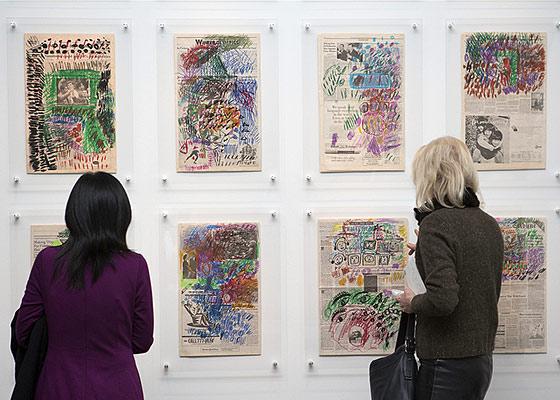
I'm throwing this one back five years to one of my favorite stories from one of my favorite poets that was originally posted in 2013. It comes with all good wishes from the blog for a wonderful, story-filled, Happy New Year.
My favorite new story comes from the writings of poet Naomi Shihab Nye and her prose piece, "Museum," from her collection, Honeybee. Born in 1952 to a Palestinian father and American mother, Nye writes about moving with her family from Missouri to Texas as a young woman. One day, after reading about a private museum founded by eccentric collector Marion Koogler McNay in San Antonio, she and her best friend Sally decide to visit. Not having the address, Nye assures her friend that she'll recognize the building from photos in the magazine (remember, we're pre-GPS here).
"There it is, pull in," Nye points out and the two women drive into the parking lot. The museum is free, and when they enter, there are only a few people seated inside. They stop talking and stare at the young women. There are no docents or staff to offer any guidance, which pleases the two visitors. They can look at what they want and not feel pressured to join a tour. Sally bounds up a set of stairs, and Naomi explores the ground floor, till arriving at a room with sculptures, a small couch, and a "radiant" print by Paul Klee, her favorite artist. Her reverie is broken when she realizes that the man from the lobby is now standing behind her.
"Where do you think you are?" he asks.
"The McNay Art Museum!" Naomi replies.
"Sorry to tell you. The McNay is three blocks over, on New Braunfels Street. Take a right when you go out of our driveway, then another right."
"What is this place?" she asks.
"Well, we thought it was our home."
Mortified and apologetic, Naomi runs to the staircase and tells Sally to come down immediately, it's an emergency! They hurry out the front door with Naomi saying, "Sorry, ohmygod, please forgive us, you have a really nice place." They drive to the real McNay which has labels for the paintings, and I can only assume, docents. Naomi writes that she never told this story to anybody, but thirty years later something strange and wonderful happens, when a woman approaches her and asks if "by any chance [she entered] a residence, long ago, thinking it was the McNay Museum?"
"Yes. But how do you know? I never told anyone."
"That was my home," the woman replied. "I was a teenager sitting with my family talking in the living room. Before you came over, I never realized what a beautiful place I lived in. I never felt lucky before. You thought it was a museum. My feelings changed about my parents after that too. They had good taste. I have always wanted to thank you."
Wow. So many lessons here, the first of which may be never to follow directions from a poet. But more importantly, the story tells us something deeper about art and ourselves and the power of communication, whether it be from a friend, a painting, or a stranger. So many things I want to say when I write are encapsulated in this story; I felt it was a good way for me to say goodbye to one year of blogging and storytelling, and welcome another.
Oh, and forget my first lesson. If a poet offers directions, just follow: it may change your life.
Listen to Naomi Shihab Nye tell her story, "Museum."




















